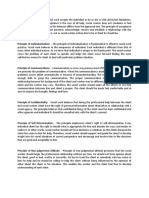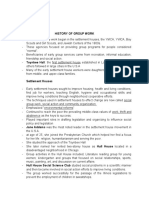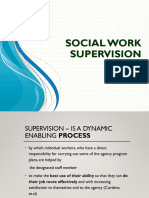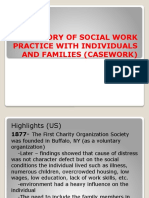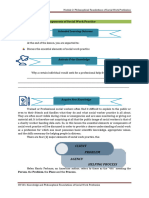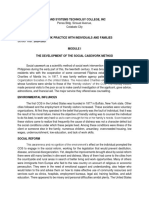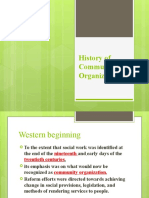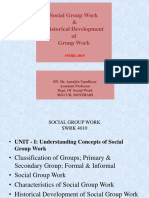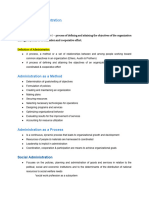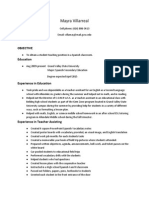Professional Documents
Culture Documents
Introduction To Social Work Community Education and Training
Introduction To Social Work Community Education and Training
Uploaded by
Hafsah HadjiSamad0%(1)0% found this document useful (1 vote)
205 views2 pagesSocial work community education and training aims to empower communities and promote positive social change. It involves imparting knowledge and skills through collaborative learning approaches. Training provides specific competencies to improve performance, while community education empowers individuals and fosters participation in decision making. Effective social work training utilizes various learning theories, including behaviorism which focuses on reinforcement, cognitivism which emphasizes information processing, and constructivism where learners actively construct knowledge through experience.
Original Description:
Basic Concepts and Training Capsules
Original Title
Introduction to Social Work Community Education and Training
Copyright
© © All Rights Reserved
Available Formats
DOCX, PDF, TXT or read online from Scribd
Share this document
Did you find this document useful?
Is this content inappropriate?
Report this DocumentSocial work community education and training aims to empower communities and promote positive social change. It involves imparting knowledge and skills through collaborative learning approaches. Training provides specific competencies to improve performance, while community education empowers individuals and fosters participation in decision making. Effective social work training utilizes various learning theories, including behaviorism which focuses on reinforcement, cognitivism which emphasizes information processing, and constructivism where learners actively construct knowledge through experience.
Copyright:
© All Rights Reserved
Available Formats
Download as DOCX, PDF, TXT or read online from Scribd
Download as docx, pdf, or txt
0%(1)0% found this document useful (1 vote)
205 views2 pagesIntroduction To Social Work Community Education and Training
Introduction To Social Work Community Education and Training
Uploaded by
Hafsah HadjiSamadSocial work community education and training aims to empower communities and promote positive social change. It involves imparting knowledge and skills through collaborative learning approaches. Training provides specific competencies to improve performance, while community education empowers individuals and fosters participation in decision making. Effective social work training utilizes various learning theories, including behaviorism which focuses on reinforcement, cognitivism which emphasizes information processing, and constructivism where learners actively construct knowledge through experience.
Copyright:
© All Rights Reserved
Available Formats
Download as DOCX, PDF, TXT or read online from Scribd
Download as docx, pdf, or txt
You are on page 1of 2
Introduction to Social Work Community Education and Training
•Basic Concepts on Social Work Community Education and Training
Here are some basic concepts related to Social Work Community Education and Training:
1. **Social Work:** A profession that aims to enhance the well-being and quality of life for individuals, families,
groups, and communities. Social workers address various social issues and challenges through a range of
interventions and support.
2. **Community Education:** The process of imparting knowledge, skills, and information to communities to
empower them and promote positive change. It often involves collaborative learning and participatory
approaches.
3. **Training:** A structured process of teaching and learning that equips individuals or groups with specific
skills, knowledge, and competencies to improve their capabilities and performance in a particular area.
4. **Empowerment:** Enabling individuals and communities to gain control over their lives and make informed
decisions, leading to increased self-esteem, confidence, and improved social functioning.
5. **Participatory Approach:** Involving community members in decision-making, planning, and implementation
processes, recognizing their expertise and insights as valuable contributions.
6. **Capacity Building:** Enhancing the abilities and resources of individuals and communities to address
challenges, solve problems, and achieve their goals effectively.
7. **Social Justice:** The fair and equitable distribution of resources, opportunities, and privileges in society,
with a focus on addressing systemic inequalities and advocating for vulnerable populations.
8. **Advocacy:** Speaking out on behalf of marginalized individuals or groups to influence policies, practices,
and attitudes that perpetuate social injustices.
9. **Cultural Competence:** The ability to work effectively with individuals and communities from diverse
cultural backgrounds, respecting their values, beliefs, and practices.
10. **Needs Assessment:** Identifying the specific needs, strengths, and priorities of a community through
systematic research and consultation, guiding the development of relevant programs and interventions.
11. **Collaboration:** Working together with various stakeholders, including government agencies, NGOs, and
community members, to achieve common goals and create a more comprehensive impact.
12. **Preventive Measures:** Initiatives aimed at preventing social issues and problems before they escalate,
focusing on education, awareness, and early intervention.
13. **Lifelong Learning:** The concept of continuous learning and personal development throughout one's life,
promoting adaptability and growth in changing social contexts.
14. **Trauma-Informed Approach:** Understanding the impact of trauma on individuals and communities and
creating safe and supportive environments that foster healing and resilience.
15. **Ethical Practice:** Adhering to a set of ethical guidelines that ensure professionalism, confidentiality, and
respect for the rights and dignity of those being served.
Training Capsules Overview of Selected Learning Theories
1. **Behaviorism:** - Learners actively construct knowledge based on
- Focuses on observable behaviors and their prior experiences and interactions.
reinforcement. - Learning is a social and cognitive process.
- Learning occurs through stimulus-response - Key concepts: scaffolding, zone of proximal
associations. development.
- Key concepts: conditioning, reinforcement, - Famous theorists: Lev Vygotsky, Jerome Bruner.
punishment.
- Famous theorists: B.F. Skinner, Ivan Pavlov. 4. **Humanism:**
- Focuses on personal growth, self-actualization,
2. **Cognitivism:** and individual potential.
- Emphasizes mental processes and internal - Learning is learner-centered and driven by
structures. intrinsic motivation.
- Learning involves acquiring, organizing, and - Key concepts: self-concept, self-directed learning.
using information. - Famous theorists: Abraham Maslow, Carl Rogers.
- Key concepts: memory, problem-solving, schema.
- Famous theorists: Jean Piaget, Albert Bandura. 5. **Social Learning Theory:**
- Learning occurs through observation, modeling,
3. **Constructivism:** and imitation.
- Emphasizes the role of social interactions in
shaping behavior.
- Key concepts: observational learning, vicarious
reinforcement.
- Famous theorists: Albert Bandura.
6. **Experiential Learning:**
- Learning is based on reflection and direct
experience.
- Learners engage in concrete experiences, reflect,
conceptualize, and apply.
- Key concepts: learning cycle, learning styles.
- Famous theorists: David Kolb.
7. **Connectivism:**
- Focuses on learning in the digital age,
emphasizing networked connections.
- Learning involves navigating and making sense of
information networks.
- Key concepts: networks, nodes, knowledge flow.
- Famous theorist: George Siemens.
You might also like
- Educational PhilosophiesDocument23 pagesEducational Philosophiesludolfn90% (20)
- Jen - S First PaddlingDocument4 pagesJen - S First PaddlingJoe33% (9)
- CO by Meneses 1Document556 pagesCO by Meneses 1joedilynbautista874No ratings yet
- Principles and Values of Social Work AdministrationDocument22 pagesPrinciples and Values of Social Work AdministrationMarion DeriloNo ratings yet
- PR English Yr4 2014Document21 pagesPR English Yr4 2014Bernard100% (1)
- Working With Individuals - PPT - RecoveredDocument38 pagesWorking With Individuals - PPT - RecoveredAngel Marie LlanitaNo ratings yet
- Toseland and Rivas Chapters 1 and 2Document32 pagesToseland and Rivas Chapters 1 and 2Zelda SitholeNo ratings yet
- Fields of Social WorkDocument19 pagesFields of Social WorkJehoshapat Cauinian100% (1)
- Knowledge and Philisophy of The SW Profession SyllabusDocument5 pagesKnowledge and Philisophy of The SW Profession SyllabusIsabela Esguerra100% (2)
- Module 1: Social Problems: Course Title: Philippine Realities and Social WorkDocument4 pagesModule 1: Social Problems: Course Title: Philippine Realities and Social WorkJade Harris' SmithNo ratings yet
- Sheafor SummaryDocument119 pagesSheafor SummaryVilla Rose Z. RaposasNo ratings yet
- Deviancy in Human BehaviorDocument60 pagesDeviancy in Human BehaviorJe Co100% (1)
- Reviewer 115Document10 pagesReviewer 115Diether SimangcaNo ratings yet
- Buklod Tao SynthesisDocument17 pagesBuklod Tao SynthesisClarinda MunozNo ratings yet
- Principles of SWDocument2 pagesPrinciples of SWJane D VargasNo ratings yet
- History of Group WorkDocument14 pagesHistory of Group WorkArtem Reynald MakipagayNo ratings yet
- SW 3010Document9 pagesSW 3010api-250788843100% (1)
- Intro To Social Work 4 DaysDocument135 pagesIntro To Social Work 4 DaysSean C.A.ENo ratings yet
- History of CODocument45 pagesHistory of CORimRose LamisNo ratings yet
- Worker Stances During The Helping ProcessDocument18 pagesWorker Stances During The Helping ProcessAlmira CayeNo ratings yet
- Social Work SupervisionDocument52 pagesSocial Work Supervisionsalman arompacNo ratings yet
- Social Change and Development PerspectivesDocument12 pagesSocial Change and Development PerspectivesJessa CarreonNo ratings yet
- HistoryDocument11 pagesHistoryArtem Reynald MakipagayNo ratings yet
- Social Realities 2023Document16 pagesSocial Realities 2023Anna Marie DayanghirangNo ratings yet
- Mclat Book ReviewDocument22 pagesMclat Book ReviewNezeil Dubduban100% (1)
- SW101 Lesson-3 (Module 2)Document5 pagesSW101 Lesson-3 (Module 2)Mia PerocilloNo ratings yet
- Social Work Practice With Communities: Presented byDocument122 pagesSocial Work Practice With Communities: Presented byElesiane Jane De LeonNo ratings yet
- Fields of Social WorkDocument5 pagesFields of Social Workrocel ordoyoNo ratings yet
- Theritical Based CommunityDocument22 pagesTheritical Based CommunityAngelica Estipular100% (1)
- Vulnerable Life Situation PerspectiveDocument13 pagesVulnerable Life Situation Perspectivecitylink set6pasig100% (1)
- Social Work EnvironmentDocument12 pagesSocial Work EnvironmentMark Anthony YumolNo ratings yet
- Please Give Me Price Quotation For The FollowingDocument3 pagesPlease Give Me Price Quotation For The FollowingMire-chan BaconNo ratings yet
- Casework SyllabusDocument2 pagesCasework SyllabusAugusta Altobar67% (3)
- Coland Systems Technolgy College, IncDocument4 pagesColand Systems Technolgy College, IncFinance Section DOSDHNo ratings yet
- The Sta. Lucia Mother'S GroupDocument8 pagesThe Sta. Lucia Mother'S GroupAnne WongNo ratings yet
- Social Environment and SW Module 1 1Document54 pagesSocial Environment and SW Module 1 1Jessa Mea Goyha Germata100% (1)
- Ecre Working With GroupsDocument21 pagesEcre Working With GroupsgladamorescanjaNo ratings yet
- Case of MaricelDocument2 pagesCase of MaricelMhay Khaeyl Badajos AndohuYhanNo ratings yet
- Swpps 2nd Sem-4Document153 pagesSwpps 2nd Sem-4nuel mabatanNo ratings yet
- Distinctive Features of Community Organization As A SocialDocument21 pagesDistinctive Features of Community Organization As A SocialArnold Poran Mandeg100% (1)
- History of RESOURCE HandumananDocument6 pagesHistory of RESOURCE HandumananRafael A. SangradorNo ratings yet
- Field Instruction Manual Salient Points: Vision, Mission of The University of Northern PhilippinesDocument7 pagesField Instruction Manual Salient Points: Vision, Mission of The University of Northern PhilippinesQuerobin gampayonNo ratings yet
- Perspectives FINALDocument41 pagesPerspectives FINALJulie IINo ratings yet
- 1.1 History of Community OrganizationDocument26 pages1.1 History of Community OrganizationBianca CuarioNo ratings yet
- Social Work AdministrationDocument2 pagesSocial Work Administrationrocel ordoyo100% (1)
- SWPPS Part 1Document48 pagesSWPPS Part 1Nadeah SolanoNo ratings yet
- Tools of Analysis in Community OrganizationDocument23 pagesTools of Analysis in Community OrganizationAngelica Estipular100% (2)
- Hbse 105 - Empowerment Perspective 1Document28 pagesHbse 105 - Empowerment Perspective 1AR MakipagayNo ratings yet
- SW 101 - Foundation of Social WorkDocument6 pagesSW 101 - Foundation of Social WorkMarie Fe Egar100% (1)
- Social Group Work & Historical Development of Group Work: SWRK 4010Document19 pagesSocial Group Work & Historical Development of Group Work: SWRK 4010Albertbon TorregosaNo ratings yet
- Module 3 Philippine Social Realities and Social WelfareDocument9 pagesModule 3 Philippine Social Realities and Social WelfareMae Angelie GarciaNo ratings yet
- Compare and Contrast The RA 4373 Ammended by RA. 10847 AssignmentDocument3 pagesCompare and Contrast The RA 4373 Ammended by RA. 10847 AssignmentXhejian EwanNo ratings yet
- Intro To Social WorkDocument35 pagesIntro To Social WorkJane April CalanaoNo ratings yet
- Social Work Administration HANDOUTSDocument17 pagesSocial Work Administration HANDOUTSLovly MoralesNo ratings yet
- Various Setting of Social WorkDocument23 pagesVarious Setting of Social WorkBienNo ratings yet
- The Field of Social WorkDocument4 pagesThe Field of Social WorktejaswinadubettaNo ratings yet
- Chapters 1 & 2 Social Welfare and Social Work: (Third Edition) Thelma Lee-MendozaDocument64 pagesChapters 1 & 2 Social Welfare and Social Work: (Third Edition) Thelma Lee-MendozaAnnabelle Buenaflor100% (1)
- History of Community Organizing in The PhilippinesDocument10 pagesHistory of Community Organizing in The PhilippinesEileen OmboyNo ratings yet
- Group Work Case Study GemshDocument11 pagesGroup Work Case Study GemshRoschelle Tan100% (1)
- For Review SWPP Case Work and AdminDocument13 pagesFor Review SWPP Case Work and AdminatlayosoNo ratings yet
- A. Definition B. Needs For Social Service C. Motivations or Reasons For Providing Social ServiceDocument5 pagesA. Definition B. Needs For Social Service C. Motivations or Reasons For Providing Social ServiceKim Rae YooNo ratings yet
- Lesson 1 ModuleDocument4 pagesLesson 1 ModuleAkira EunHee100% (1)
- SW145Document17 pagesSW145Hafsah HadjiSamadNo ratings yet
- Cicl Part 2Document4 pagesCicl Part 2Hafsah HadjiSamadNo ratings yet
- QEALIS Registration FormDocument3 pagesQEALIS Registration FormHafsah HadjiSamadNo ratings yet
- 195Document5 pages195Hafsah HadjiSamadNo ratings yet
- SW145Document17 pagesSW145Hafsah HadjiSamadNo ratings yet
- Methods of Determining The Training NeedDocument10 pagesMethods of Determining The Training NeedHafsah HadjiSamadNo ratings yet
- Adult Learning TheoryDocument27 pagesAdult Learning TheoryHafsah HadjiSamadNo ratings yet
- SW145Document8 pagesSW145Hafsah HadjiSamadNo ratings yet
- Transition Course SyllabusDocument3 pagesTransition Course SyllabusInstitute for Higher Education PolicyNo ratings yet
- Answer KeyDocument15 pagesAnswer KeyallanNo ratings yet
- OBJECTIVES-WPS OfficeDocument3 pagesOBJECTIVES-WPS OfficeCel Callao Dela CruzNo ratings yet
- RumiDocument35 pagesRumiMohammad TabishNo ratings yet
- Derewianka B. 2015 A New Grammar Companion For Teachers Chapter 2Document92 pagesDerewianka B. 2015 A New Grammar Companion For Teachers Chapter 2Xime NicoliniNo ratings yet
- Combining Language DescriptionsDocument12 pagesCombining Language DescriptionsarezooNo ratings yet
- Coestudentteachingresume MayraDocument3 pagesCoestudentteachingresume Mayraapi-268242019No ratings yet
- Core Competencies in Palliative Care - An EAPC White Paper On Palliative Care Education - Part 2 FBDocument6 pagesCore Competencies in Palliative Care - An EAPC White Paper On Palliative Care Education - Part 2 FBDiklatpimempat AngkatanlimabelasNo ratings yet
- Measuring Tourists Emotional Experiences PDFDocument15 pagesMeasuring Tourists Emotional Experiences PDFCristhian Londoño CarvajalNo ratings yet
- Economics For Managers REGISDocument25 pagesEconomics For Managers REGISwendell jun udarbeNo ratings yet
- Bukasa Mukalenga CVDocument4 pagesBukasa Mukalenga CVbukasa MukalengaNo ratings yet
- School Based Information and Education Campaign ProgramDocument13 pagesSchool Based Information and Education Campaign ProgramBarangay MotibotNo ratings yet
- Trend in Family Business SuccessionDocument20 pagesTrend in Family Business Successionrameshwar_malavNo ratings yet
- Worksheet - 2Document2 pagesWorksheet - 2jhuma palmaNo ratings yet
- Form 138 Grade 4-6Document10 pagesForm 138 Grade 4-6Gil Camporazo75% (4)
- Lesson Plan SubtractionDocument4 pagesLesson Plan Subtractionapi-338469786No ratings yet
- Core Values and ConceptsDocument3 pagesCore Values and ConceptsFaise RajputNo ratings yet
- Muet Speaking StrategiesDocument16 pagesMuet Speaking Strategieszarina_ahmd8069100% (1)
- 43 Fun Quick SheetDocument1 page43 Fun Quick SheetAlvaro DantronkNo ratings yet
- FinalDocument24 pagesFinalHafizah JackNo ratings yet
- Actividades Guía de Aprendizaje 4Document2 pagesActividades Guía de Aprendizaje 4Yenifer PalaciosNo ratings yet
- BRAOU Eligibility Test Model Paper - Engligh Language, General Knowledge&Aptitude (Urdu)Document8 pagesBRAOU Eligibility Test Model Paper - Engligh Language, General Knowledge&Aptitude (Urdu)AnweshaBoseNo ratings yet
- Dan Zhang, Bin Wei Eds. Mechatronics and Robotics Engineering For Advanced and Intelligent Manufacturing PDFDocument457 pagesDan Zhang, Bin Wei Eds. Mechatronics and Robotics Engineering For Advanced and Intelligent Manufacturing PDFHanna Mar100% (1)
- Cẩm Nang Đề Minh Họa Môn Tiếng Anh Năm 2025Document27 pagesCẩm Nang Đề Minh Họa Môn Tiếng Anh Năm 2025Khánh Vinh NguyễnNo ratings yet
- DAILY LESSON LOG OF M11GM-Ig-1 (Week Seven-Day Two) : Expected AnswersDocument4 pagesDAILY LESSON LOG OF M11GM-Ig-1 (Week Seven-Day Two) : Expected AnswersXyrah Luna Manliguez BasilanNo ratings yet
- Inquiry Social Studies LessonDocument9 pagesInquiry Social Studies Lessonapi-365745277No ratings yet
- Using Competencies in Learning and Development: December 2009 v1.3 1Document14 pagesUsing Competencies in Learning and Development: December 2009 v1.3 1Siddharth PalNo ratings yet














